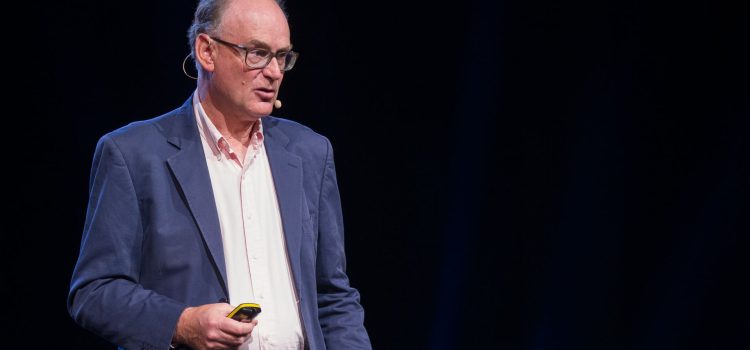

This article is an excerpt from the Shortform book guide to "The Rational Optimist" by Matt Ridley. Shortform has the world's best summaries and analyses of books you should be reading.
Like this article? Sign up for a free trial here.
Why does Matt Ridley think we shouldn’t rush into green energy? What is his solution for the climate change crisis?
Matt Ridley urges caution and restraint in response to climate change. He argues that we should fully consider the risks of reacting too hastily or zealously in our efforts to mitigate the effects of a warming planet.
Let’s explore Matt Ridley’s climate change opinion, and how he thinks we can defeat it.
We Shouldn’t Rush Toward a Green Energy Transition
We’ll explore the core of Matt Ridley’s climate change argument against an overreaction, looking at:
- How fossil fuels have played an indispensable role in driving humanity’s prosperity—and why we’ll continue to rely on them to propel global economic growth
- The high costs and potential negative consequences associated with a transition to green energy
- The capacity of innovation and technology to address the consequences of climate change
In Defense of Fossil Fuels
Ridley writes that fossil fuels have played a key part in propelling human prosperity, particularly since the onset of the Industrial Revolution. He asserts that without the power of coal, oil, and natural gas, we wouldn’t have many of the advances we take for granted today. It was the energy from coal that powered the steam engines and factories of the Industrial Revolution, marking a historic shift from agrarian societies to industrialized ones. This energy source allowed for significant increases in productivity, which, in turn, drove economic growth and improved living standards.
(Shortform note: Not all experts agree with Ridley’s assertion that the Industrial Revolution—and the fossil fuels that powered it—raised living standards. One way experts have measured historical living standards is through biological indicators like average height. This is because average height in a population can reflect nutritional status, health, and living conditions. As a general rule, taller average height indicates good health and high living standards. But during the Industrial Revolution, experts have found that the height of English soldiers declined, hinting at worsening living conditions. Perhaps even more telling, research found that life expectancy in mid-19th century Liverpool fell by 25 years.)
Further, Ridley points out that developing countries in particular still rely heavily on these resources to fuel their economic growth. Calls for the swift abandonment of fossil fuels frequently come from developed countries that have already reaped the benefits of industrialization. However, these calls often neglect to acknowledge the stark economic implications for developing countries. With current technology and prices, trying to economically develop without the use of fossil fuels, at least in the early stages, could consign these countries to a future of poverty and stagnation.
(Shortform note: Some experts argue that, contrary to Ridley’s claim, we don’t need fossil fuels to meet the rising energy needs of the developing world. They write that even though global energy demand is projected to rise by 50% by 2050 as people in Africa and Asia ascend to the middle class, this need could be met by renewable energy. They argue that the demand for fossil fuels is being artificially propped up by governments, which spent $1.3 trillion subsidizing them in 2023. Experts suggest that governments could redirect these investments toward renewable energy, enabling the world to address its growing energy demands without deepening our dependence on fossil fuels.)
There Are Major Costs to a Green Energy Transition
Ridley further writes that climate pessimists pay too little attention to the costs and potential economic downsides of a transition to greener sources of energy. According to Ridley, the transition to renewable energy sources has been slower and costlier than enthusiasts often acknowledge, and renewables have been unable to match the yield of fossil fuels. Moreover, harnessing renewable energy requires significant infrastructure, land, and resources. As a result, implementing these projects can lead to unintended consequences such as disruption of ecosystems or competition for land use.
(Shortform note: Since the publication of The Rational Optimist in 2010, the cost of green energy has fallen significantly. In the decade that followed the book’s publication, the cost of electricity from solar power dropped by 85%, while onshore and offshore wind energy costs decreased by 56% and 48%, respectively. With green energy now a more affordable option, it seems to be in a stronger position to meet the world’s rising energy demands.)
Ridley adds that governments around the world would need to invest massive subsidies to make renewable sources competitive—and that this would distort market forces. This is because the cost of these subsidies is shared among all taxpayers, while the benefits, such as reduced energy bills or profits from generated green energy, primarily go to wealthier citizens who can afford the initial investment in expensive equipment like solar panels. Thus, the poorest people end up subsidizing green energy for the wealthiest.
(Shortform note: Although Ridley decries the subsidies and market distortions he claims would be needed to effect a green energy transition, it’s worth noting that the fossil fuel industry is already subsidized, to the tune of $7 trillion globally in 2022. These subsidies comprise both explicit financial support from governments—such as tax breaks and direct funding—and implicit subsidies, like the costs of environmental damage passed on to the rest of society in the form of air and water pollution, global warming, and traffic congestion. Some experts argue that by phasing out these subsidies and making fossil fuel prices reflect their true environmental and health costs, countries could make significant strides in combating climate change.)
Technology and Human Innovation Can Address the Climate Crisis
Ridley sees humankind’s boundless capacity for innovation and exchange of ideas as our secret weapons in dealing with changing climate. He writes that pessimists underappreciate the technological solutions we’re capable of inventing. As we comprehend more about our changing climate, our technological responses will become increasingly efficient and targeted. Advances in energy capture, storage, and distribution will mitigate the impacts of climate change. This includes our ability to sequester carbon by removing CO2 from the atmosphere and securely storing it in different reservoirs including forests, soils, oceans, or underground formations.
(Shortform note: Some writers have a more skeptical take on the efficacy of technology in addressing the climate crisis. One study focusing on the economic impact of climate change on American agriculture suggests that despite technological advancements, the damage from climate change continues to accumulate. If we look ahead to the year 2100, technology is expected to mitigate only 13% of projected economic damage. The research emphasizes that innovation alone may not be sufficient in low-income countries where incentives and resources for technological development are limited. The findings instead underscore the importance of reducing emissions as the most effective response to climate change.)

———End of Preview———
Like what you just read? Read the rest of the world's best book summary and analysis of Matt Ridley's "The Rational Optimist" at Shortform.
Here's what you'll find in our full The Rational Optimist summary:
- The connection between free trade and cultural evolution
- Why Matt Ridley defends the use of fossil fuels
- Why foreign aid can’t fix developing nations






